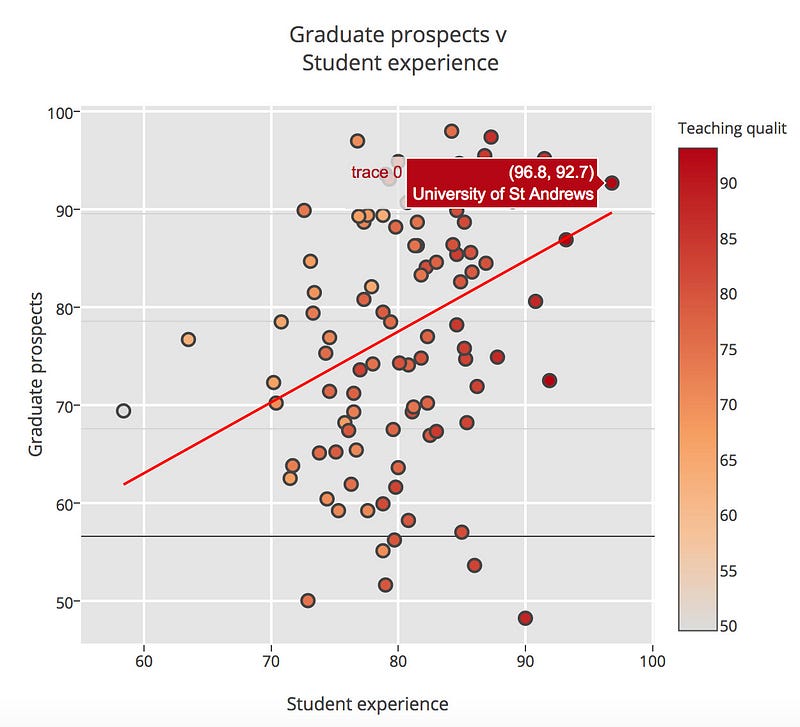Student Experience Varies With Teaching Quality and Not Directly Research Quality

Student Experience Against Teaching Quality and Research Quality
I’m a Professor and I’ve always made sure that I commit strongly to both teaching and research. To me, the two must go together. I am often reminded of the statement from Jo Johnston (brother of Boris Johnson), the former Universities Minister, who outlined that:
Too many universities in England have allowed teaching to become “a poor cousin” to research
He then hit home with the comment that while some academics …”go the extra mile to support students”, there were too many who adopted:
a “disengagement contract”
Jo illustrates his point with:
“I hear this when I talk to worried parents, such as the physics teacher whose son dropped out at the start of year two of a humanities programme at a prestigious London university, having barely set eyes on his tutor.
while:
“Her other son, by contrast, studying engineering at Bristol, saw the system at its best: he was worked off his feet, with plenty of support and mostly excellent teaching.
In some government circles, there is a feeling that the more you invest in research at university level, the higher the quality of the teaching will be. Personally, I see no such link, in that high-quality researchers often buy themselves out of teaching, and where universities can put their resources into research rather than teaching. There is also no guarantee that what you invest in, in your research, will filter through into teaching.
From what I see too, there is good and not so good research that is undertaken, and, in some cases, the linkage between research topics and the topics that need to be taught to students is perhaps not always as strong as it could be. The UK, perhaps, his heading to a two-tier system of academics who are research-active or teaching-active, and the days of the great teacher who is highly research active are perhaps receding.
So what evidence is there? Well, my little open-source bots have been grabbing data from The Times University 2016 survey [data]. First, we will plot student experience against teaching quality [here][Web page]:

and we see a strong correlation (R-squared=0.999) and:
STUDENT EXPERIENCE (%) = 0.727 * TEACHING QUALITY (%) + 25.122
For the linkage between research and teaching quality, it is a fairly patchy correlation [here][Web page]:

If fact there is a slight downward trend where increasing research quality gives lower teaching quality. If you want to analyse your own it is here.
Now if we drill in Computer Science, we can plot teaching quality against research quality [here][Web page]:

We can see that there is not a strong correlation, in fact, there is a slight downward trend in research quality and teaching quality goes up. So is the student experience linked to teaching quality. Let’s plot [here][Web page]:

This gives an R-square value of 0.995, which is a strong correlation, and we can map as:
Student experience = 0.745 * Teaching quality + 23.141
For research we get a far more random plot [here][Web page]:

While there is a general upward trend, we see that it is not a strong correlation. When it comes to the student experience and graduate prospects, it can be seen that there is a general upward move, there is a great deal of variation across the universities [here][Web page]:

Conclusions
Research is an important part of university work, but teaching is just — if not more — important. Overall graduates will always be the greatest output from a university. Research, too, should not just be measured by the number of citations or quality of a journal, but by how it effects our societies. As tax payers, we should see amazing new scientific break-throughs which stimulate new economic active, great social changes, and spin-out companies generating new wealth and supporting high quality jobs.